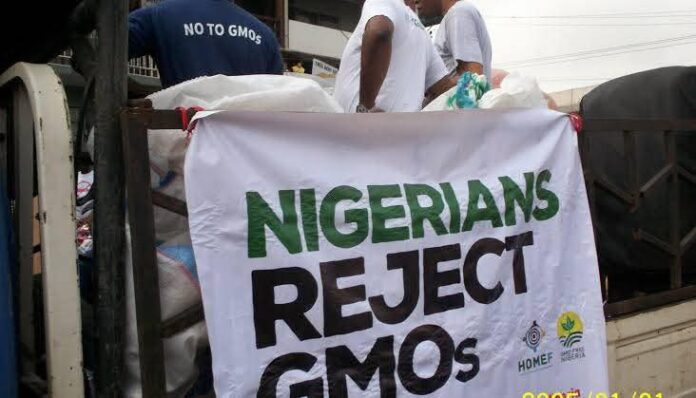By: Joy Musa
In the swirling discourseetically Modified Organisms (GMOs) in Nigeria, a refreshing and courageous voice has emerged from an unlikely quarter privilege. Dr. Ify Aniebo Rhodes-Vivour, an Associate Professor of Genomics and Molecular Biology, and her husband, architect and politician Gbadebo Rhodes-Vivour (GRV), have become prominent figures in the resistance against GMO adoption in Nigeria. Their stance, rooted in scientific insight and social responsibility, offers a compelling narrative in a country grappling with the implications of biotechnology on public health and food sovereignty.
The debate over GMOs in Nigeria is not new, but recent events have reignited public scrutiny. The “lapo vs nepo” social media drift highlighting the divide between the underprivileged and the elite.has inadvertently revived concerns about the health and environmental risks posed by GM products. For many Nigerians, GMOs represent a silent threat, a ticking time bomb embedded in their food systems.
Introduced formally in 2001 with the establishment of the National Biotechnology Development Agency (NBDA), GMOs gained legal backing through the National Biosafety Management Agency Act of 2015. The first GM crop, Bt cotton, was sold in 2018, and since then, the proliferation of GM products has accelerated, often without adequate public awareness or regulation.
Dr. Ify Rhodes-Vivour’s opposition to GMOs is particularly striking given her background. As the daughter of Brigadier General Augustine Aniebo (rtd) and wife to GRV, she belongs to Nigeria’s elite class the so-called “nepo babies.” Yet, she has consistently used her platform and expertise to challenge the status quo.
Her credentials are formidable. A molecular biologist with a specialization in genomics, Dr. Ify won a $1 million prize from the Bill & Melinda Gates Foundation for her groundbreaking research on malaria. Ironically, Gates is one of the most prominent global advocates for GMOs. That Dr. Ify would publicly oppose GMOs despite this connection speaks volumes about her integrity and commitment to public health.
In March 2019, during a public hearing on the amendment of the Biosafety Act, Dr. Ify delivered a passionate plea against GMO adoption. “Nigeria should not even have a conversation about embracing the GMO in the first place,” she declared, underscoring the urgency of protecting Nigeria’s agricultural and health systems from corporate exploitation.
GRV’s activism complements his wife’s scientific advocacy. As early as 2015, he led protests and awareness campaigns against GMOs, mobilizing civil society groups and funding demonstrations out of pocket. His efforts reflect a deep-seated belief in food sovereignty and environmental justice values often absent in Nigeria’s political discourse.
During the same 2019 public hearing, GRV made submissions condemning GMO proliferation. His activism, rooted in youthful exuberance and Western education, has helped galvanize public awareness and challenge the narrative that GMOs are a necessary evil for development.
One of the most alarming aspects of GMO use in Nigeria is the widespread application of glyphosate-based herbicides such as “Wipeout,” “Touchdown,” and “Sarosate.” These chemicals, marketed by over 20 unregulated companies, are used extensively by rural farmers who are unaware of their carcinogenic properties.
Scientific studies have linked glyphosate to cancer, kidney failure, and liver diseases. In the United States, Monsanto the producer of glyphosate was ordered to pay over $2 billion in damages to victims of glyphosate-induced cancer. Yet in Nigeria, these products continue to circulate with minimal oversight, posing a grave threat to public health.
Dr. Ify and GRV’s advocacy is not merely oppositional it is visionary. They argue that Nigeria, blessed with vast arable land and rich biodiversity, does not need GMOs to achieve food security. Instead, the country should invest in sustainable agriculture, organic farming, and indigenous crop development.
Their stance challenges the narrative that GMOs are a panacea for hunger and poverty. It also calls into question the ethics of importing foreign solutions that may compromise local health and environmental integrity.
What makes Dr. Ify and GRV’s activism particularly commendable is their willingness to fight for a cause that offers little personal gain. As members of Nigeria’s elite, they could easily remain silent or align with global corporate interests. Instead, they have chosen to stand with the vulnerable, using their privilege to amplify the voices of the marginalized.
Their example is a challenge to all Nigerians whether “lapo” or “nepo” to engage critically with the forces shaping our food systems and public health. It is a reminder that true leadership is not about status, but service.
In the ongoing GMO debate, Dr. Ify Rhodes-Vivour and GRV have emerged as beacons of hope and integrity. Their efforts underscore the need for informed, ethical, and people-centered approaches to biotechnology in Nigeria. As the country stands at a crossroads, their voices remind us that science must serve humanity not corporate profit.







